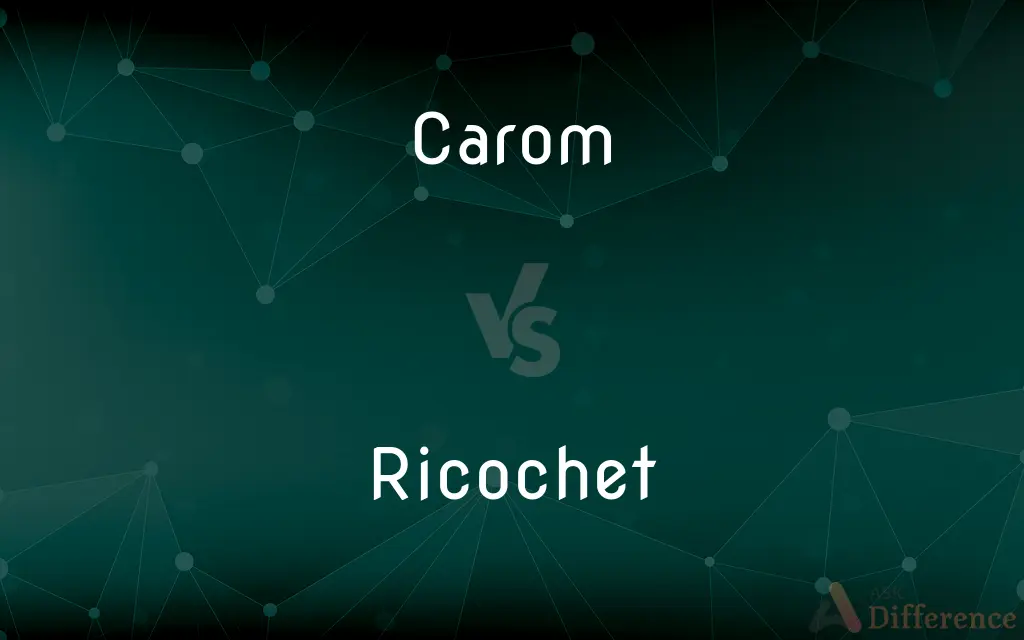Carom vs. Ricochet — What's the Difference?
By Tayyaba Rehman — Updated on September 27, 2023
Carom refers to a rebound following a collision, especially in billiards, while Ricochet denotes an object bouncing off a surface, often after being fired or thrown.

Difference Between Carom and Ricochet
Table of Contents
ADVERTISEMENT
Key Differences
Carom is commonly used in the context of billiards or pool games, where a ball strikes another ball or the side of the table and then moves in a new direction. Ricochet, on the other hand, usually describes the action of an object, often a bullet or stone, skipping off a surface, typically at an angle.
When someone mentions a "carom shot" in billiards, they are referring to a shot where the cue ball hits multiple balls. In contrast, the term "ricochet" might be used in shooting sports or even in casual conversation to describe a bullet bouncing off a hard surface, changing its course.
Carom can also describe a collision followed by a change in direction, not just in games but in broader contexts as well. Ricochet more often paints a vivid picture of something deflecting swiftly and unpredictably after striking a surface.
In everyday conversation, one might use "carom" metaphorically, describing, for instance, a sudden shift in a conversation after an unexpected remark. "Ricochet," however, would likely evoke scenarios involving more dynamic and abrupt deflections, like a sudden change in life direction after an unexpected event.
Comparison Chart
Primary Context
Billiards or pool games.
Shooting or throwing an object.
ADVERTISEMENT
Definition
A rebound after hitting an object or surface.
A bounce off a surface, especially at an angle.
Usage Metaphorically
Used to describe a change in direction after a collision.
Describes a swift and unpredictable deflection.
Sound
Less sharp, more of a bump or hit.
Sharper, often associated with a quick bounce or skip.
Derived From
French "carombe" meaning "the red ball in billiards".
French "ricocher" meaning "to skim the surface of water".
Compare with Definitions
Carom
To hit and bounce off.
The toy caromed off the furniture.
Ricochet
A rebound or skip off a surface.
The stone made a ricochet on the pond's surface.
Carom
A strike and rebound in billiards or pool.
He executed a perfect carom shot.
Ricochet
The action of a bullet or other object bouncing off a surface.
The bullet took a dangerous ricochet off the rock.
Carom
A glancing collision.
The two cars had a slight carom in the parking lot.
Ricochet
To deflect swiftly and unpredictably.
The news made his emotions ricochet.
Carom
A sudden change in direction after an impact.
The discussion took a carom after his unexpected remarks.
Ricochet
A quick, sharp rebound.
The puck made a ricochet off the goalie's pads.
Carom
A collision followed by a rebound.
Ricochet
To bounce with a sudden change in direction.
His plans ricocheted after the unexpected news.
Carom
A shot in billiards in which the cue ball successively strikes two other balls. Also called billiard.
Ricochet
A ricochet ( RIK-ə-shay; French: [ʁikɔʃɛ]) is a rebound, bounce, or skip off a surface, particularly in the case of a projectile. Most ricochets are caused by accident and while the force of the deflection decelerates the projectile, it can still be energetic and almost as dangerous as before the deflection.
Carom
A similar shot in a related game, such as pool.
Ricochet
To rebound at least once from a surface.
Carom
To collide and rebound; glance
The car caromed off the guardrail into the ditch.
Ricochet
The act or an instance of ricocheting.
Carom
To make a carom, as in billiards.
Ricochet
(military) A method of firing a projectile so that it skips along a surface.
Carom
To cause to carom.
Ricochet
An instance of ricocheting; a glancing rebound.
Carom
A shot in which the ball struck with the cue comes in contact with two or more balls on the table; a hitting of two or more balls with the player's ball.
Ricochet
To rebound off something wildly in a seemingly random direction.
Carom
(uncountable) A billiard-like Indian game in which players take turns flicking checker-like pieces into one of four goals on the corners of a board measuring one meter by one meter.
Ricochet
(military) To operate upon by ricochet firing.
Carom
(spices) ajwain
Ricochet
A rebound or skipping, as of a ball along the ground when a gun is fired at a low angle of elevation, or of a fiat stone thrown along the surface of water.
Carom
(intransitive) To make a carom shot in billiards.
Ricochet
A glancing rebound
Carom
To strike and bounce back; to strike (something) and rebound.
Ricochet
Spring back; spring away from an impact;
The rubber ball bounced
These particles do not resile but they unite after they collide
Carom
A shot in which the ball struck with the cue comes in contact with two or more balls on the table; a hitting of two or more balls with the player's ball. In England it is called cannon.
Carom
To make a carom.
Carom
A glancing rebound
Carom
A shot in billiards in which the cue ball contacts one object ball and then the other
Carom
Rebound after hitting;
The car caromed off several lampposts
Carom
Make a carom
Carom
A rebound following a collision.
The ball made a carom off the wall.
Common Curiosities
Is Carom primarily used for billiards?
Yes, Carom is most commonly associated with billiards but can describe any rebound after a collision.
Can Carom be used outside of games?
Yes, Carom can describe any collision followed by a change in direction, not just in games.
What does Ricochet usually depict?
Ricochet often describes an object, like a bullet, bouncing off a surface, especially at an angle.
Is a Carom shot in billiards when the ball sinks into a pocket?
Not necessarily. A Carom shot often refers to the cue ball hitting multiple balls, not directly pocketing a ball.
Is Ricochet a violent action?
Not necessarily. While Ricochet can refer to bullets, it can also describe pebbles skipping on water or similar gentle actions.
Can emotions Ricochet?
Metaphorically, yes. Emotions can "ricochet" or swiftly change in reaction to sudden news or events.
What's the main difference between Carom and Ricochet?
Carom typically refers to rebounds in games or gentle bounces, while Ricochet often indicates sharper deflections, like a bullet off a wall.
Does a Carom always change the object's direction?
Typically, yes. A Carom implies a rebound or deflection leading to a change in direction.
Can I use Carom metaphorically?
Yes, Carom can be used metaphorically to describe sudden changes or shifts after encounters or events.
Would a ball bouncing softly off a pillow be a Carom or Ricochet?
It would likely be described as a Carom due to the gentler nature of the bounce.
Can the terms be used interchangeably?
While there's some overlap, they have distinct connotations. Carom is softer and often game-related, while Ricochet suggests a sharper, more abrupt rebound.
Are both words derived from French?
Yes, Carom comes from "carombe" and Ricochet from "ricocher".
Can Ricochet be dangerous?
Yes, especially in contexts like shooting, a ricochet can be unpredictable and potentially harmful.
Can you describe Ricochet in terms of sound?
Ricochet often suggests a sharper sound, associated with a swift bounce or skip.
Which term, Carom or Ricochet, implies a quicker deflection?
Ricochet usually implies a swifter and more abrupt deflection.
Share Your Discovery

Previous Comparison
Nuisance vs. Negligence
Next Comparison
Summary vs. SumAuthor Spotlight
Written by
Tayyaba RehmanTayyaba Rehman is a distinguished writer, currently serving as a primary contributor to askdifference.com. As a researcher in semantics and etymology, Tayyaba's passion for the complexity of languages and their distinctions has found a perfect home on the platform. Tayyaba delves into the intricacies of language, distinguishing between commonly confused words and phrases, thereby providing clarity for readers worldwide.











































